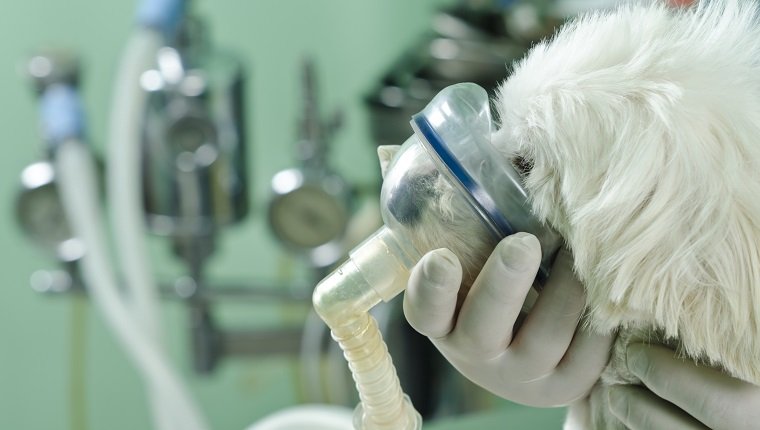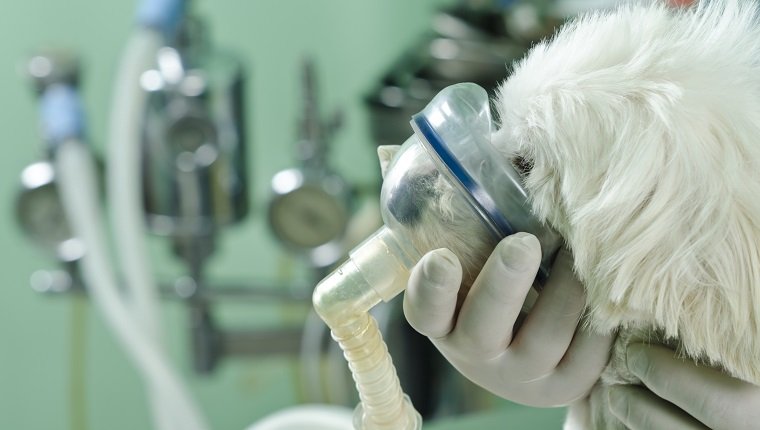
Pulmonary edema in dogs is a buildup of fluid in the lungs that can cause difficulty breathing and poor oxygen circulation throughout the body. It can be cardiogenic, meaning it results from heart failure, or non-cardiogenic, meaning it’s due to conditions outside of the heart.
Both forms result in similar symptoms, though their causes and treatments differ. In either case, permanent damage to the lungs can occur if the condition isn’t treated. However, depending on the cause, the prognosis for affected dogs is generally good if the underlying cause and symptoms are treated properly.
If you see the signs in your dog, then you must consult your veterinarian right away so they can diagnose it, find the cause, and begin treatment.
Here’s what you should know about the symptoms, causes, and treatments for pulmonary edema in dogs.
Symptoms Of Pulmonary Edema In Dogs

The symptoms of pulmonary edema in dogs can vary from mild to severe depending on how much fluid has built up in the lungs. These symptoms can also be similar to other medical conditions, which is why you must see a vet for a diagnosis.
Here are several signs of pulmonary edema in dogs.
- Difficulty breathing
- Coughing
- Wheezing
- Fast breathing
- Breathing with mouth open
- Crackling sound while breathing
- Blue lips and tongue
- Weakness
- Collapse
Causes Of Pulmonary Edema In Dogs

The causes of pulmonary edema in dogs vary depending on the type.
The causes of cardiogenic pulmonary edema are associated with congestive heart failure and include the following:
- High sodium diet
- Cardiomyopathy
- Mitral valve regurgitation
Here are some causes of non-cardiogenic pulmonary edema in dogs:
- Electrocution
- Head trauma
- Cancer
- Nearly drowning
- Smoke inhalation
- Pneumonia
- Toxins such as snake venom
- Airway obstruction
- Strangulation
- Laryngeal paralysis
- Seizures
- Acute respiratory distress syndrome
- Leptospirosis
- Anemia
Treatments For Pulmonary Edema In Dogs

Treatment for pulmonary edema in dogs depends on the severity of the symptoms.
For dogs experiencing extreme respiratory distress, vets may provide oxygen therapy as well as antibiotics to prevent pneumonia. Intravenous fluid therapy may also be used to help excess fluid flow through the body more easily. Diuretics can also help dogs pass excess fluids.
Further treatment depends largely on the cause of the condition. Treating the underlying cause can be simple, and it may be resolved with oxygen therapy, or it can be complicated and long-term, especially with congestive heart failure.
Your vet will prescribe a proper course of treatment based on the cause of your dog’s condition. Often, the prognosis is good as long as treatment begins quickly. Although, with issues like congestive heart failure, the pulmonary edema may be likely to recur. If that is the case, the prognosis could be quite poor.
Your vet may also prescribe a low sodium diet, vasodilators, and medication to manage the condition. Follow your vet’s guidelines for further care closely, continue with follow-up vet visits, and watch your dog’s health for any changes.
Has your dog ever suffered from pulmonary edema? What was the cause? Let us know in the comments below!








